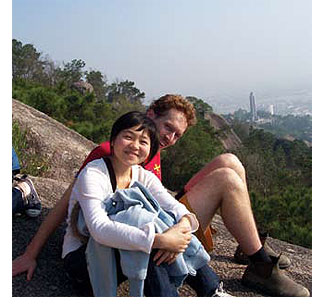

Warren Howden
University of Melbourne, Australia
Exchange to Shantou University, China
Having studied Chinese for many years before going on exchange, I went to Shantou hoping to develop native speaker level fluency, and work lots on reading and writing, which has never been as good as my speaking. Beyond that, I had very few expectations, and basically no idea about the place I would be spending the next five months.
For those with a genuine interest in languages, China is an amazing place. Mandarin is but one of many languages and dialects spoken in the middle kingdom, often only necessary as a means of communication for people from different regions. Those with a common home town will speak their local dialect to each other, in some cases as close to Mandarin as New Zealand English is to Australian, in others further away than Spanish is from German. In Shantou the local language is called Chaoshan; on campus at Shantou University the most commonly spoken tongue (outside of the classroom) was Cantonese. Around my dormitory was a mixture of Thai, Mandarin and Cantonese; one bloke even spoke Arabic, but nobody else did so he mostly stuck to Chinese. Mandarin was the common language of myself and my classmates, so if we went out together local people could understand us chatting but rarely would we have any idea what they talked to each other about.
An Arts/Music student in Melbourne, I wasn・t expecting to be doing much music while living in China. Six months later, it is incredible that through the Shantou University music programme I・m looking at revisiting Shantou twice this year.
Putting on an amateur Broadway production for the first time ever in Shantou, they needed an extra keyboard player as well as a flautist; it just so happened that I could manage both parts. Putting together an English speaking musical (directed by an American), performed by Chinese students, was a pretty remarkable experience.
Besides myself the band included natives of both the US and China, so I became the translator for all rehearsals, and also had to take charge of cues, as our Chinese band director had no comprehension of the English dialogue.
 In Australia I basically study Chinese and music, and to have the opportunity to work on both of these at the same time, in a practical environment while on exchange, was just amazing. The show had no shortage of issues, rehearsals coming down to the wire for it to be ready by opening night, but somehow when the time came it turned out great. Acting and singing in their third language, the students did a wonderful job, while the band managed to keep the audience・s attention focused on the stage, which is the way it should happen. The university・s management was so pleased with the performances that there have been more scheduled for May and July this year, which they will fly me back to be a part of.
In Australia I basically study Chinese and music, and to have the opportunity to work on both of these at the same time, in a practical environment while on exchange, was just amazing. The show had no shortage of issues, rehearsals coming down to the wire for it to be ready by opening night, but somehow when the time came it turned out great. Acting and singing in their third language, the students did a wonderful job, while the band managed to keep the audience・s attention focused on the stage, which is the way it should happen. The university・s management was so pleased with the performances that there have been more scheduled for May and July this year, which they will fly me back to be a part of.
Studying in Shantou was pretty chilled out, really. Although I felt the pressure of the workload a fair bit in the beginning, as I became more busy and less diligent, I discovered that it was actually ok to not be totally up to date. Teachers were pretty understanding, in fact in contrast to my Thai friends with a particular aversion to our regular 8am classes, I actually appeared to be quite a conscientious student. As with anything, you get out of it what you put in, so I・d work hard on the subjects I found useful, while letting the boring ones slide. The great thing about in country language study is that you・re practising all the time, regardless of being in or out of the classroom.
Starting class at 8am every day was not something I ever really got used to. However, it meant finishing at midday, leaving afternoons free to play basketball, swim in the reservoir, go into town or go walking in the hills around uni.
To be honest, I had never even heard of Shantou before I heard about the Cheung Kong Scholarship; in a way I arrived there by most extraordinary chance, which I am most grateful for.
© Copyright 2018 CK Group. All rights reserved.
